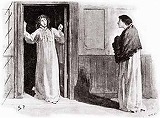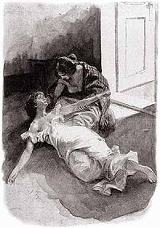
“I could not sleep that night. A vague feeling of impending misfortune impressed me. My sister and I, you will recollect, were twins, and you know how subtle are the links which bind two souls which are so closely allied. It was a wild night. The wind was howling outside, and the rain was beating and splashing against the windows. Suddenly, amid all the hubbub of the gale, there burst forth the wild scream of a terrified woman. I knew that it was my sister’s voice. I sprang from my bed, wrapped a shawl round me, and rushed into the corridor. As I opened my door I seemed to hear a low whistle, such as my sister described, and a few moments later a clanging sound, as if a mass of metal had fallen. As I ran down the passage, my sister’s door was unlocked, and revolved slowly upon its hinges. I stared at it horror-stricken, not knowing what was about to issue from it. By the light of the corridor-lamp I saw my sister appear at the opening, her face blanched with terror, her hands groping for help, her whole figure swaying to and fro like that of a drunkard. I ran to her and threw my arms round her, but at that moment her knees seemed to give way and she fell to the ground. She writhed as one who is in terrible pain, and her limbs were dreadfully convulsed. At first I thought that she had not recognized me, but as I bent over her she suddenly shrieked out in a voice which I shall never forget, ‘Oh, my God! Helen! It was the band! The speckled band!’ There was something else which she would fain have said, and she stabbed with her finger into the air in the direction of the doctor’s room, but a fresh convulsion seized her and choked her words. I rushed out, calling loudly for my stepfather, and I met him hastening from his room in his dressing-gown. When he reached my sister’s side she was unconscious, and though he poured brandy down her throat and sent for medical aid from the village, all efforts were in vain, for she slowly sank and died without having recovered her consciousness. Such was the dreadful end of my beloved sister.”

“One moment,” said Holmes; “are you sure about this whistle and metallic sound? Could you swear to it?”
“That was what the county coroner asked me at the inquiry. It is my strong impression that I heard it, and yet, among the crash of the gale and the creaking of an old house, I may possibly have been deceived.”
“Was your sister dressed?”
“No, she was in her night-dress. In her right hand was found the charred stump of a match, and in her left a match-box.”
“Showing that she had struck a light and looked about her when the alarm took place. That is important. And what conclusions did the coroner come to?”
“He investigated the case with great care, for Dr. Roylott’s conduct had long been notorious in the county, but he was unable to find any satisfactory cause of death. My evidence showed that the door had been fastened upon the inner side, and the windows were blocked by old-fashioned shutters with broad iron bars, which were secured every night. The walls were carefully sounded, and were shown to be quite solid all round, and the flooring was also thoroughly examined, with the same result. The chimney is wide, but is barred up by four large staples. It is certain, therefore, that my sister was quite alone when she met her end. Besides, there were no marks of any violence upon her.”
“How about poison?”
“The doctors examined her for it, but without success.”
“What do you think that this unfortunate lady died of, then?”
“It is my belief that she died of pure fear and nervous shock, though what it was that frightened her I cannot imagine.”
“Were there gypsies in the plantation at the time?”
“Yes, there are nearly always some there.”